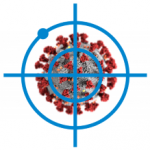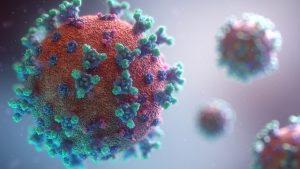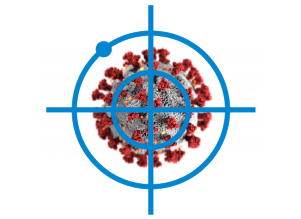 On June 11, 2020, Regeneron Pharmaceuticals, Inc. announced the start of the first clinical trial of REGN-COV2 for the prevention and treatment of COVID-19. REGN-COV2 is a cocktail of the human antibodies REGN10933 and REGN10987, which were derived from Regeneron’s parallel efforts using both humanized VelocImmune® mice and blood samples from recovered COVID-19 patients to generate a large and diverse collection of antibodies targeting multiple different regions of the receptor-binding domain of the SARS-CoV-2 spike protein. Two papers describing the creation of REGN-COV2 and its anti-viral activity have been accepted for publication in Science.
On June 11, 2020, Regeneron Pharmaceuticals, Inc. announced the start of the first clinical trial of REGN-COV2 for the prevention and treatment of COVID-19. REGN-COV2 is a cocktail of the human antibodies REGN10933 and REGN10987, which were derived from Regeneron’s parallel efforts using both humanized VelocImmune® mice and blood samples from recovered COVID-19 patients to generate a large and diverse collection of antibodies targeting multiple different regions of the receptor-binding domain of the SARS-CoV-2 spike protein. Two papers describing the creation of REGN-COV2 and its anti-viral activity have been accepted for publication in Science.
The REGN-COV2 clinical program will consist of four separate study populations: hospitalized COVID-19 patients, non-hospitalized symptomatic COVID-19 patients, uninfected people in groups that are at high-risk of exposure and uninfected people with close exposure to a COVID-19 patient. The placebo-controlled trials will be conducted at multiple sites. The first two adaptive Phase 1/2/3 studies are evaluating REGN-COV2 as a treatment for hospitalized and non-hospitalized patients with COVID-19. The Phase 1 portion will focus on virologic and safety endpoints, and the Phase 2 portion will focus on virologic and clinical endpoints. Data from the Phase 1 and Phase 2 studies will be used to refine the endpoints and determine size for the Phase 3 studies.
REGN-COV2 is the 3rd anti-SARS-CoV-2 antibody-based drug to enter clinical study in the past 2 weeks. On June 1, 2020, Eli Lilly and Company announced LY-CoV555 had entered clinical study, and on June 7. 2020, Junshi Biosciences announced JS016 had entered clinical study.



